MercoPress. South Atlantic News Agency
Tag: Favelas
-
Wednesday, February 28th 2024 - 10:47 UTC
Police raids leave at least 7 dead in Rio favelas
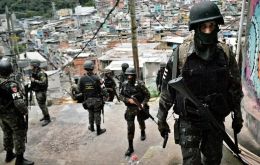
A large-scale deployment by the Police in various Rio de Janeiro favelas (slums) has left at least seven people dead after gunfights between law enforcement officers and suspected criminals, it was reported. Two servicemen were wounded.
-
Tuesday, June 2nd 2020 - 09:02 UTC
“I can't breathe” chant favela residents in Rio protesting crimes committed by police against black people
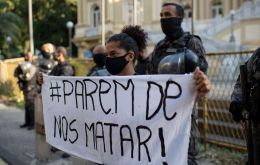
Hundreds of demonstrators converged on the square in front of the Rio de Janeiro state government palace Sunday, protesting crimes committed by the police against black people in the Brazilian city’s poor neighborhoods, known as favelas.
-
Wednesday, March 25th 2020 - 07:55 UTC
Drug gangs impose a strict curfew in Rio do Janeiro's favelas to combat “the disease of the rich”

The “baile funk” dance parties have been called off. Some open-air drug markets are closed for business. Gangs and militias have imposed strict curfews. Coronavirus is coming, and Rio de Janeiro's lawless favelas are gearing up for the onslaught.
-
Tuesday, April 16th 2019 - 09:16 UTC
Collapsed buildings in Rio's favelas were under protection of organized crime

Brazilian authorities say they knew about structural risks in the area where a pair of buildings collapsed but were unable to act due to the threat posed by organized crime.
-
Thursday, April 11th 2019 - 09:15 UTC
Caimans on the loose in flash flooded Rio's favelas

Residents of a hillside Rio de Janeiro favela risk finding hungry caimans at their front door after the city was hit hard by heavy flooding caused by torrential rain.
-
Tuesday, November 13th 2018 - 07:21 UTC
Human Rights Commission blasts Brazil for weak protection of land and gender rights
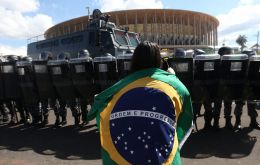
The Inter-American Commission on Human Rights (IACHR) on Monday expressed concerns about the state and outlook for rights in Brazil, singling out for particular worry some of the signature campaign issues of far-right President-elect Jair Bolsonaro.
-
Monday, August 7th 2017 - 21:14 UTC
Brazilian army troops storm Rio favelas to crack crime gangs
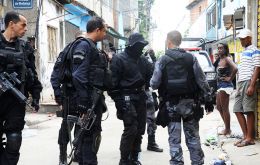
Thousands of Brazilian army troops raided Rio de Janeiro slums in a pre-dawn crackdown on crime gangs over the weekend, leaving parts of the city looking like a war zone on the first anniversary of the opening of the Olympic Games. Five favelas were targeted by around 1,300 police and 3,600 troops in a sweep starting at 4 a.m., the Rio state security service said in a statement.
-
Thursday, April 28th 2016 - 07:27 UTC
Amnesty said killings in Rio's favelas have increased alarmingly ahead of Olympics
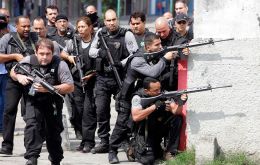
Amnesty International said on Wednesday that residents of Olympic host Rio de Janeiro's slum favelas are “living in terror” after 11 people were killed in police shootings in the past month. The rights group said at least 307 people were killed by police in the city last year and called on Brazilian authorities to take action in the 100 days ahead of the start of the Rio Games on August 5.
-
Friday, April 11th 2014 - 12:12 UTC
Footage of live mugging of a woman while being interviewed in Rio do Janeiro

Brazilian TV is showing footage of a woman being robbed while being interviewed on television about crime near Rio de Janeiro’s main train station. The images of the interview conducted Wednesday by TV Globo were posted on its G1 internet news portal and come just a few weeks before the beginning of the World Cup.
-
Monday, April 7th 2014 - 06:05 UTC
Army occupies favela in Rio because police was unable to retain control
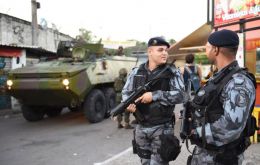
With only 68 days to the World Cup some 2,700 Brazilian troops seized control Saturday of the Mare favela, shantytowns complex, which is considered Rio de Janeiro's last major drug-gang stronghold and located in a strategic area for security reasons: a through area for the city's airport and the Maracaná stadium.
